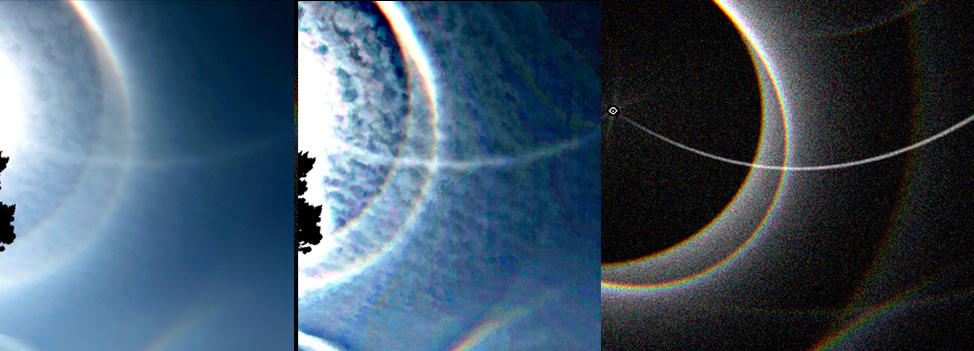
 |
| Below is an infralateral arc from horizontal column crystals. The 46° halo is also visible. Perhaps there is a trace of the lower Wegener arc. |
| Oregon Rare Halos - Phillip Bonn captured rare halos at Shore Acres, Oregon, USA. See the previous OPOD for the display's brightest halos. ©Phillip Bonn |
| In the top image (1) we are looking to the left of the high sun and its encircling 22° and circumscribed halos. The white parhelic circle curves through the sun and around the sky. Careful inspection of the unenhanced image shows a rare 46 degree circular halo to the left of centre. A second rarity - a Wegener arc - curves from the top of the circumscribed halo and crosses the 46 degree halo. The two halos are clear in the extreme image enhancement (image 2). Randomly, or at least poorly, aligned crystals of some type produced the 46 degree halo together with the inner 22 degree one. The crystals for once must have had optically perfect end faces to permit the 46� halo ray path passing between a hexagonal end face and prism side face. The Wegener arc is from horizontal column crystals. All the halos in this display can be accounted for by these and poorly oriented crystals - plate crystals were absent. The Wegener rays path is the same as that for the bright circumscribed halo - passage between two prism side faces inclines 60� - except that the ray is internally reflected from an end face. |
Above (3) a video still shows the Wegener arcs where they cross the parhelic circle opposite the sun. |
 |
 |
 |
 |

| About - Submit | Optics Picture of the Day | Galleries | Previous | Next | Today |
